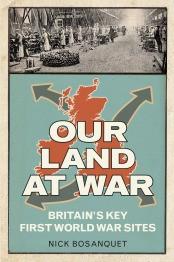I turned forty last month, hardly the time for a walking stick and a pipe but I do have a favourite chair and cushion in my house that I fight over regularly with my Jack Russell terrier King George. I don’t know if I’m getting grumpy in my old age but I find it hard to latch onto a lot of the bandwagon books being written at the moment about The Great War. I’m not sure I find them offensive or even badly written; they just don’t seem to float my boat. I want excitement, refreshing stories, new angles and ideas and, above all, something to keep me glued to the chair whilst reading. Is this the book to do just that?Sadly, not!
Museum gift shop sprang to mind when I first read Our Land at War; one of those books that sit awkwardly on the shelf somewhere between RationRecipes of WW2…how to darn a stewand All Our Yesterdays; THUNDER The RAFs first flying Shire horse.
The book is as frustrating to read as it is to try and review.
Imagine a dictionary that isn’t in alphabetical order. Exactly!
It’s a peculiar book with no real direction, as such, at times it seem to be printed in no particular order. The concept is easy enough to understand; cities, towns and villages all of who contributed to GreatBritain’s needs during the First World War are listed with a brief description of what part they played and the impact they had.
Well that’s what I expected anyway!
This all sounds great in practice, but what you’re actually given is over two hundred pages divided into ten chapters of mind boggling subjects such as New Weapons where it repeats the references to the tank over and over again and The Supreme Command where it basically tells you every house in London Churchill ever visited and a few he didn’t (Churchill seems to feature heavily in a book about WW1).
Don’t get me wrong though. The actual entries, though concise, are quite fascinating. The obvious thing most of us will do is look up our local town or village to see what it did; well, that’s what I did and although I knew most of the information, to the casual reader it’s still very interesting.
For example, a big player in the war at sea was the port of Dover, which is not too far from where I live. It had a system known famously as the Dover Patrol which was basically a blockade to stop German U-boats and shipping from entering the English Channel. Something I was totally unaware of, though, was an action that took place in the April of 1917 between German destroyers and torpedo boats and two British destroyers, HMS Broke and HMS Swift. The action was so fierce it culminated in some vicious hand-to-hand fighting after HMS Broke rammed and became locked with the German Destroyer SMS G42. The mind boggles.
There is a wealth of other interesting reads. Such as Boots the Chemist in Nottingham being the first manufacturer of gas masks and King George V (not my Jack Russell) ordering the flowerbeds of Buckingham Palace to be turned into vegetable plots. He also personally signed letters to over 150,000 POWs returning back to the UK!
There are photos a plenty and some great black and white sketches but the maps of locations are a little naive and again none too helpful.
All in, It’s all a little clumsy, to be honest, and is as hard to read through in any order as it is to randomly pick it up and let the pages present themselves. On that note, the information is there, but there is just not enough of it presented with any real logic.
The other thing of note (and i was tempted to leave this out) was the author’s obvious obsession with Churchill. If Iread his name once I must have read it over a dozen times. It’s an obsession I don’t share and the point of this is simple; Bosanquet is someway to being firm and outspoken in his political roots shall, we say, and probably not the ideal person to be writing about what is realistically a working class profession; that of working your fingers to the bone for your country in time of war while your sons are being killed on the battlefield. Churchill included.
Reviewed by Phil Hodges for War History Online.
OUR LAND AT WAR.
Britain’s Key First World War Sites
Nick Bosanquet
The History Press
ISBN 978-0-7524-9962-8
